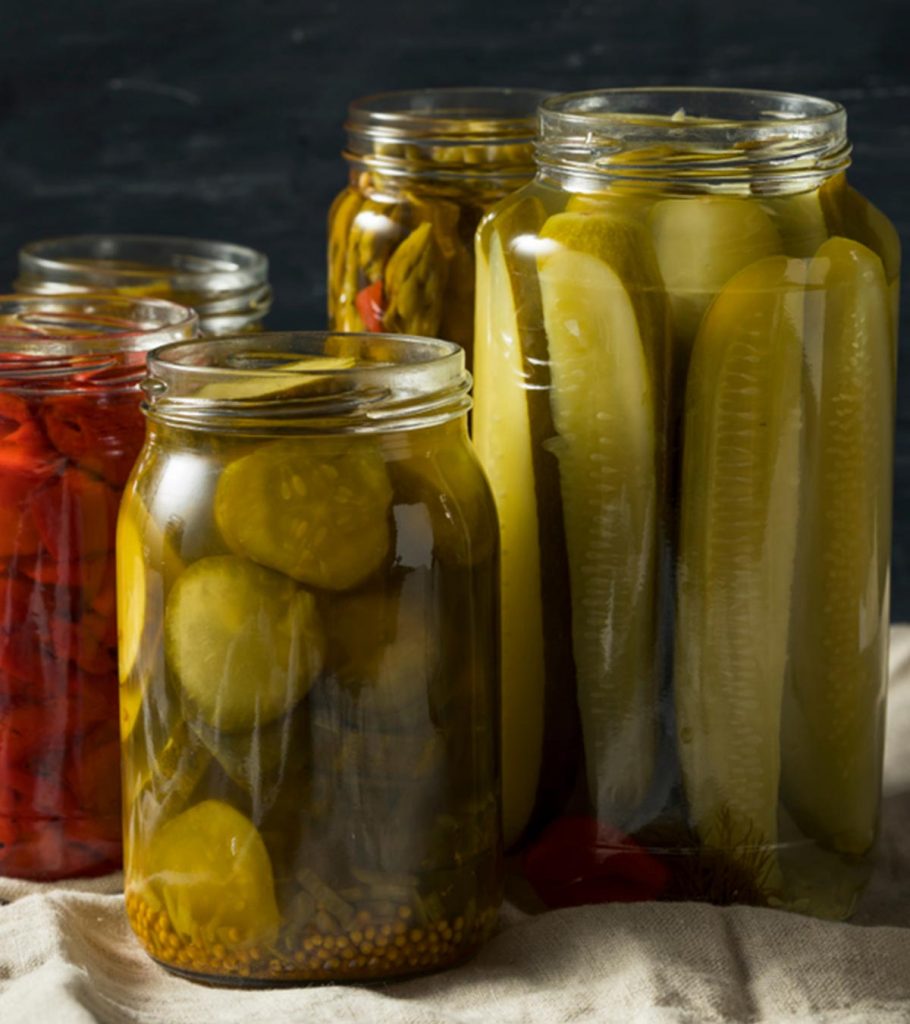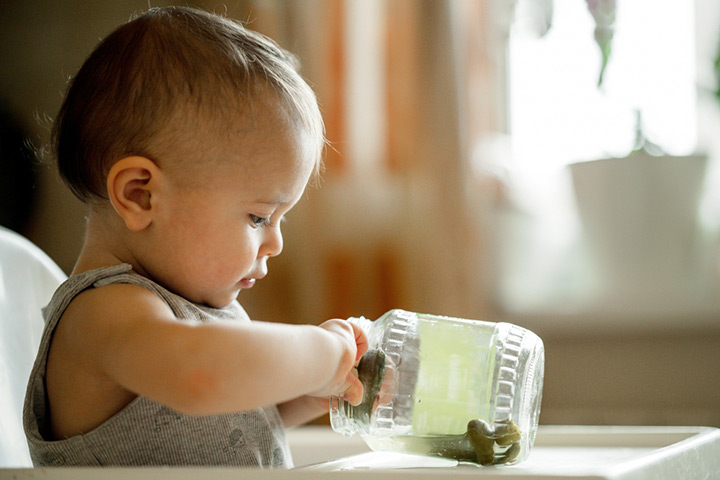Several parents might want to try pickles for babies as soon as their baby begins eating solids. Pickles are an attractive choice due to their ability to add flavor to plain food. Besides, these tangy-sour, crunchy fermented foods harbor specific medicinal and functional properties for which they are prevalent worldwide (1).
You can buy pickles from a store or prepare them at home by immersing the food in brine (salt or salty water) or vinegar. Evidence shows pickling can raise food’s shelf life and nutritional value. In addition, it can offer healthy bacteria (probiotics) that may promote gut health (2).
Read on to know about the right age to feed pickles to babies with the benefits they can offer to them.
When Can Babies Start Eating Pickles?
“Babies can begin eating pickles when they start solids at around 6 months old. It can be beneficial to introduce babies to different tastes and textures and pickles are unique in both of these characteristics,” says Trista Best, Registered Dietitian at Balance Supplements Inc.
Healthy, full-term babies can occasionally consume pickles from six months of age. However, if you are unsure about using pickles for your baby, consult a pediatrician. Once a doctor allows feeding pickles to your baby, feed them pickles in small amounts only. For instance, you can give a tiny piece of cool, pickled cucumber or carrot to a baby as a teething snack to suck and nibble. It will ease their gum inflammation and might also distract them from the pain and irritation.
Pickles can also serve as good finger food to hone a baby’s pincer grasp, which is vital to support effective baby-led weaning. While you give your baby pickles to eat, don’t leave them unsupervised. It is essential as pickles are raw foods that can pose a potential choking risk for babies. According to a New York State Department of Health report, choking is the fourth leading cause of unintentional death in children under five, with food-related incidents being the most common cause of nonfatal choking in young children. To ensure their safety, always serve tiny pieces or small slices of pickle to avert the risk of choking.
Are There Any Benefits Of Pickles For Babies?
Although pickles contain loads of sodium, their cautious use for babies may be beneficial. Pickles have several nutrients and gut-friendly microorganisms that may promote healthy digestion, support gut health, and boost immunity (3). Also, healthy microorganisms may activate certain compounds and confer health benefits.
For instance, lactic acid bacteria can convert phenolic compounds to active metabolites that may impart specific health benefits. Furthermore, fermenting foods can reduce anti-nutrient compounds, enhancing nutrient absorption in the body.
“Pickles on store shelves aren’t typically truly fermented, which means they do not provide beneficial probiotics. Naturally fermented pickles contain these beneficial bacteria that can improve baby’s gut health,” notes Best.
So, if you want to feed pickles to your baby, use naturally fermented pickles and not vinegar-fermented versions. to reap these benefits because pickles fermented with vinegar don’t have healthy bacteria or probiotics (4).
Do Pickles Raise Any Health Concerns?
Naturally fermented pickles are usually high in sodium, a mineral that can put an undue load on the baby’s immature kidneys (5). Besides, early exposure to salty foods may alter a toddler’s taste preferences later in life. It means that as the baby grows, they may crave salty foods and overconsume them. Overconsumption of salt can expose an individual to several health risks, such as high blood pressure and cardiovascular diseases (CVD), over time (6).
Thus, to ensure that the baby isn’t overeating sodium, read the nutrition label carefully and pick low-sodium pickles. Alternatively, you can prepare pickles at home with various foods, such as vegetables, fruits, meat, egg, dairy, and fish. Whether homemade or store-bought, feed pickles to babies occasionally and in minimum quantities of up to a tablespoon.
Pickles may cause an upset stomach or reflux due to their acidity in sensitive babies. Therefore, avoid feeding pickles to them unless your pediatrician suggests otherwise.
Can Pickles Cause A Diaper Rash?
Lactic acid bacteria in pickles digest sugars and produce lactic acid making the pickle acidic (7). In some sensitive babies, acidic foods, such as pickles, may irritate their skin and trigger rash around their lips, mouth, and buttocks. Alternatively, acidic foods may irritate the gut lining, causing diarrhea, resulting in diaper rash.
Pickles And Allergy
Pickle allergy cases aren’t well documented. Yet, it is considered that, like any other food, pickles too can cause an allergic reaction in sensitive babies. In most cases, pickle allergy happens from additives, such as preservatives added to pickles, rather than the pickled food.
The signs and symptoms of pickle allergy are similar to that of a food allergy. If you are feeding your baby pickles, introduce it in small amounts with no new food introduced simultaneously.
Wait and watch for three to five days for any signs of intolerance or allergy. If a baby looks uncomfortable after ingesting the pickle, discontinue feeding and reintroduce it after some time, say five days or a week. In case of an allergic reaction, stop feeding pickles and consult your healthcare provider promptly.
It is usually recommended to introduce pickles to babies in small amounts after 6 months of age in healthy, full-term infants. It has the potential to improve the gut microbiota, digestion, gut health, and immunity over time. The different flavors and textures of pickles may also help your infant avoid fussy eating later in life. However, feed your infant low-sodium pickles to avoid a salty taste preference in them and limit their consumption to one spoonful. Also, keep an eye out for symptoms of allergy and intolerance while your baby is enjoying the unique texture and flavor of pickles.
Key Pointers
- Babies may consume pickles in small quantities after turning six months.
- Pickles contain high sodium but are beneficial as they enhance gut-friendly bacteria, support digestion, and boost immunity.
- Overconsumption of pickles may increase the risk of high blood pressure and cardiovascular disease.
- Always give naturally fermented pickles to babies. Store-bought or vinegar pickles do not have health benefits.
- Wait and watch for a few days after introducing pickles to babies to avoid chances of allergic reactions.















